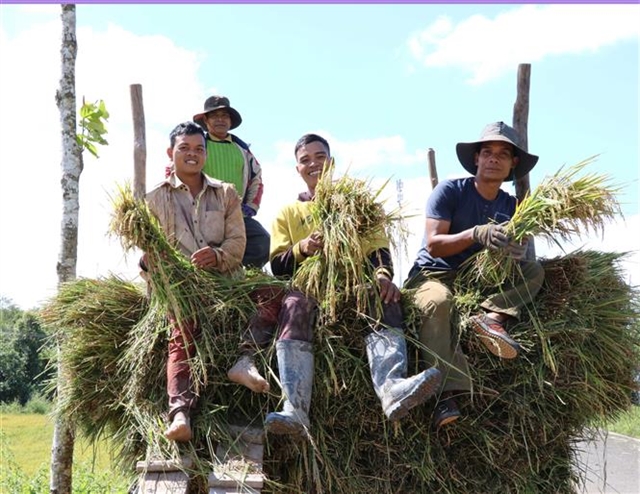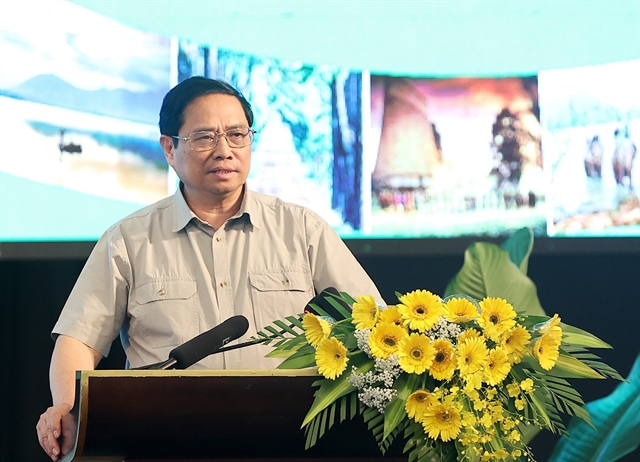 Society
Society

 |
Jrai people harvesting rice in Gia Lai Province in the Central Highlands. — VNA/VNS Photo Hồng Điệp
ĐẮK LẮK — Prime Minister Phạm Minh Chính celebrated the successes achieved by the Central Highlands region, including the development of the agricultural sector and its contribution to the area's sustained economic growth.
The Prime Minister spoke at a Politburo conference in the region yesterday, saying that developing the Central Highlands in a rapid and sustainable manner is the mission of the entire political system.
The event was a review following 20 years of implementing the Politburo’s official resolution and conclusion on socio-economic development as well as national defence in the Central Highlands.
The region has achieved comprehensive results over the past two decades, said the Prime Minister.
The economic scale has been expanded to VNĐ287 trillion (US$12.3 billion), equivalent to 14-times the figure when the programme first started in 2002.
The gross regional domestic product (GRDP) in the 2002 - 2022 period grew 7.98 per cent on average, the highest among the regions.
The Central Highlands’ agricultural sector saw substantial development of a large agricultural production area, with many items accounting for a high percentage of the country’s exports, such as coffee, rubber, pepper, and other fruits.
The regional economic structure is also shifting to rapidly increase the industrial and service sectors.
Delegates at the conference agreed that the Central Highlands needs to focus on strengthening regional and national connections, investments, and the strategic infrastructure system. It is also necessary to promote the solidarity and cultural identity of the highlands’ ethnic groups.
The areas seeing improvements include cultural life, poverty reduction, and the State administrative management in environmental protection and conservation. Managing and utilising the forest and its resources have also been identified as a factor of utmost importance to the local people’s livelihoods.
National defence and security are also maintained, with a focus put on building the Party and the management capacity of its members, and the effective operation of the Fatherland Front and socio-political organisations, contributing to unity among the people.
However, shortcomings still persist in the slowed and unsustainable development in the region, as well as in its GRDP and the unbalanced local budgets. Poverty reduction is still facing many challenges with a large number of poor and near-poor households that are at risk of falling back into poverty.
The percentage of communes achieving the new rural-style status is still modest, placing 5th among six regions. Regional and inter-regional connections are still limited, with a lack of long-term strategies, while the system of infrastructure is not yet comprehensive to respond to the demands of development.
Multiple disadvantages are still present in the sectors of culture, healthcare, education, development and nature conservation.
 |
Prime Minister Phạm Minh Chính addresses the conference. — VNA/VNS Photo Dương Giang
PM Chính said that the Central Highlands is not reaching its full potential due to limited policies and frameworks, as well as the insufficient investment and institutions that could not address the region’s shortcomings.
“The focus must be promoting independence and innovation, and the action-oriented spirit of the local Party, authorities and people in the region,” he said.
The PM required that provinces in the Central Highlands effectively implement the resolutions of the Party for the region, and enhance the regional connections with the South Central Coast and the Southeast regions, as well as the major economic centres of the countries, the Mekong sub-region, the development triangle of Việt Nam - Laos - Cambodia, and ASEAN.
According to the PM, the development of the Central Highlands needs to ensure progress, sustainability and harmony, with humans at the core and culture as the foundation.
National defence and security are crucial, he added, as well as building the Party for a strong and transparent political system with highly-capable members while preventing corruption.
PM Chính also emphasised that the region’s growth needs to follow the green, circular development model with a rich national cultural identity, shifting the people’s way of thinking from agricultural production to an agricultural economy. This will in turn attract tourists, ensure resource preservation and safety, and quality of life.
Regarding solutions for the future, the PM put a focus on completing the system of development policies, digital transformation, and a comprehensive understanding from all management levels of the role of the region in socio-economic development, environment, and national defence and security.
Resources should be focused to increase the potential for development and technology application in agricultural production, clean and renewable energy, tourism, environmental protection, and adapting to climate change.
Land resources must be developed to become an important internal force for socio-economic development, responding to the strategic position of the Central Highlands in the country.
PM Chính also required that other suggestions be made to complete the report and to propose a new Politburo solution on building and developing the Central Highlands by 2030, with a vision to 2045. — VNS




